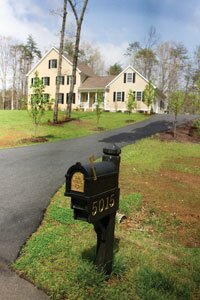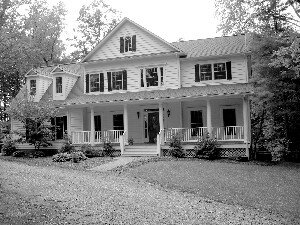NEWS- Going once: Area foreclosures up-- but it could be worse

This house that sold at auction belongs to mortgage broker Chris Prang, who advises homeowners to avoid making late payments on their mortgages but was unable to follow that advice himself.
PHOTO BY WILL WALKER

On the day that the Prang home was sold at auction, Chris Prang posted credit scoring tips on his mortgage blog.

"How big is too big?" That was the question posed by the Hook two years ago on this Earlysville house, whose owners owe over $570,000.
FILE PHOTO BY ROSALIND WARFIELD-BROWN
A small crowd gathered in front of the Albemarle County Courthouse April 17 to watch two houses go on the auction block. With the number of foreclosures rising all over the country, such scenes are daily occurrences in many cities. What was unusual about these?
For starters, the owners of the houses were into lenders for at least half a million each, and one of them belongs– uh, belonged– to a mortgage broker.
"The first six years I was doing this, it was rare to have one over $200,000," recalls auctioneer Phyllis White. "I had one in Farmington, one in Glenmore. Then the money became easier."
White has been handling foreclosure auctions for eight years for Samuel I. White, the Virginia Beach-based law firm her father started in 1950. Back then, she says, he did real estate closings and wills with the help of two or three people. She says business "mushroomed" after the firm took on a few foreclosures.
"Now it's our main business," she says. "Now it's a firm of over 200 people."
The April 17 auction was pretty typical for White, an Albemarle resident who travels around the western region for the firm. "Often, no one shows up," she says. She has regulars who do, but they weren't among the seven who came to Court Square for these two sales.
First up was a house at 524 Allen Road in Earlysville. It's been on the market for two years, and in fact was the subject of a Hook "On the Block" feature in 2006 when it was listed for $739,500. By last summer, the price had dropped to $685,900. Today the 4,100-square-foot house on nearly four acres is assessed at $595,400.
Bargain-hunters who frequent courthouse sales have learned that they can be iffy propositions. For a variety of reasons, an auction can be canceled at the last minute.
"The owner has up to that moment to pay off with a cashier's check or declare bankruptcy," explains White. "They call to get the reinstatement figure. That happens regularly."
But not this time. As the clock struck 11:30, White, in an ankle-length dress, quietly called the small crowd to attention and asked for an opening bid of $574,281.
"That's a lot higher than the list price," noted a hat-wearing man. The foreclosure notice had indicated the borrower owed $547,500.
Statewide, White has seen a rise in the number of foreclosures. "I think last year we had double the previous year," she says.
As for the Charlottesville area, "I've seen a couple more here, but generally it's very minimal," White says, especially compared to places like Culpeper or Prince William County. Real estate blogger Jim Duncan agrees that the number of Charlottesville foreclosures is not "catastrophic" like other areas, but they're having an impact on prices of nearby houses. If a house is foreclosed for a $250,000 debt, he says, it's going to be hard to list one for $350,000 in the same neighborhood.
Back in Court Square, Phyllis White asks again, "Is there anyone going to bid?"
No response. The bank takes the house.
Next up is 5015 Meadowlark Court in the Foxwood Forest neighborhood in northern Albemarle County. Here, the owner owes $500,000 on the first deed of trust. But this time there are two additional liens on the property– $150,000 on a second deed of trust and $75,000 on a third note, a credit line, according to Albemarle County records.
"If they're not there to defend it, they lose it," says White of such lien holders.
Lenders have allowed the owner to pile more than $725,000 in debt on a property assessed by the county at only $691,200. But the real shocker is the owner's vocation: he's Chris Prang, a mortgage broker.
"It was really bad timing for us," says Prang. "We had bought a house a Wintergreen and dumped a lot money in it. Then there was the news about mortgages–" news that affected Prang's own business.
Prang works out of his house for Carteret Mortgage; he says his mortgage consulting is geared toward the Christian community and home schoolers, which is what his wife does with their three children.
"I try to do things above-board," says Prang.
Their original loan was with American Home Mortgage, the once high-flying firm that flamed out last August with a sudden bankruptcy and put about 7,000 Americans out of work. Then things went bad for the Prangs after they used their equity– or what they thought was their equity– to finance another business venture: buying houses and fixing them up.
"I had another foreclosure," Prang admits. "I had perfect credit until recently."
He advises homeowners in over their heads to avoid late payments, but he admits that's easier said than done. He suggests that people unable to keep up with their payments try something called a "deed in lieu of foreclosure," in which, with approval, they simply give the house back to the bank.
"It's not as harmful to your credit as a foreclosure," he says, but concedes, "I'm in the business, and I didn't know about it."
Another option is a listing forbearance, what Prang describes as asking the bank, "Can you give me a break while I try to sell it?"
He also recommends staying in touch with the bank, and he points out that the Piedmont Housing Alliance offers services to people in trouble. PHA, a HUD-approved housing counseling agency, has seen a 174 percent increase in calls for help since 2007, according to PHA's Shelley Murphy. If the back payments are curable, she'll negotiate with lenders and provide advice on making changes in the budget– for free.
"They're sitting there and know they can't make that payment," she says. "They need to make that call. Virginia is one of the fastest states in the country to foreclose. They can do it within 45 days. That's serious."
Prang is mortgage savvy, and yet he says, "There was nothing else I could have done."
He and his wife bought their house for $650,000 in 2005 and converted the garage to boost it to 5,000 square feet, the biggest house in the neighborhood. They listed it a year ago for $800,000, then $775,000, and finally, $699,000 a few weeks ago, less than what they owe on the three mortgages.
"I could have come current," confesses Prang. "I have the money. But that meant dumping a lot of money in a house losing value."
And he says if he had sufficient funds, he wouldn't pour them into buying a house now. "Why take the chance to buy something that a year from now could be worth a lot less?"
Prang isn't in favor of current plans for the government to bail people out of bad investments. He personally didn't want government help in avoiding foreclosure.
"In the long run, I'm going to be okay," he says. "I know my credit has been dinged, but I know how to repair it."
In front of the Courthouse, White is on the phone, and she tells the small crowd that the reserve on the Prangs' first mortgage is $516,135. That higher number can include missed payments and the auctioneer's fee, she explains.
As with the day's first auction, there are no bids. Mortgage broker Chris Prang and his wife Andrea have just lost their home. The holder of the first mortgage gets the house, while the two other note-holders get nothing.
"This is not fun for anyone to go through," says Prang. "We're Christians, and we feel God has a plan, and it's all going to work out."
He promises they'll leave the house in good condition. And next for the family?
"When I get off the phone with you," he tells a reporter, "I'm going to the packing store and get some boxes."
#